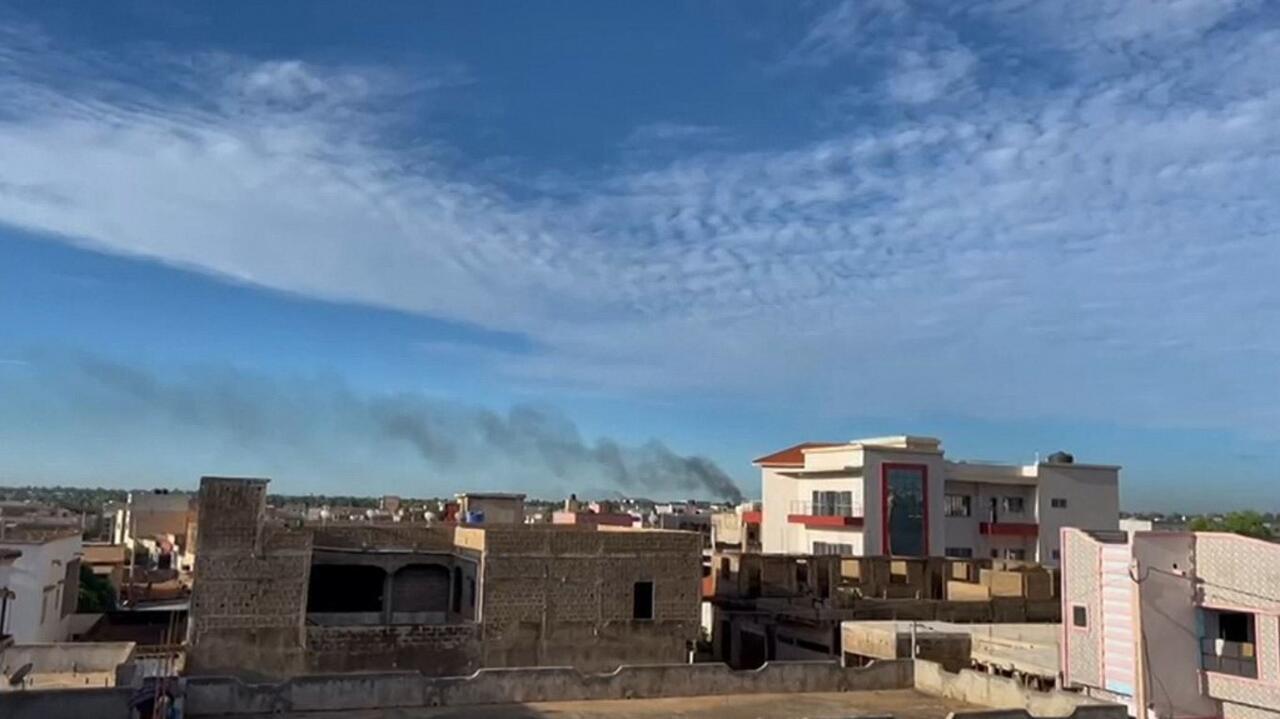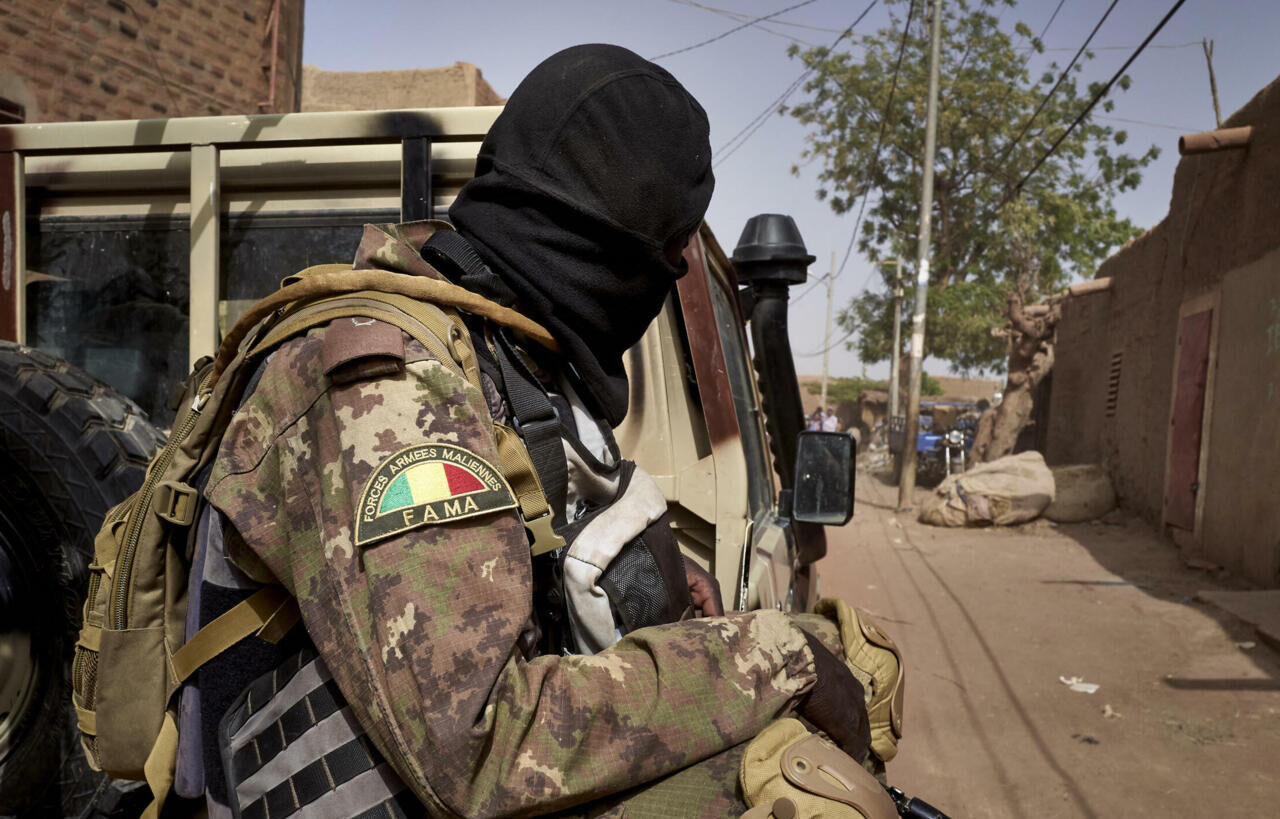On a day that brought Mali’s capital, Bamako, to its knees, scores of people were killed in a brutal jihadist attack claimed by the al-Qaida affiliate Jama’a Nusrat ul-Islam wa al-Muslimin (JNIM). This brazen assault, targeting multiple locations including an elite police training academy, has cast serious doubts on the military junta’s ability to effectively address the 12-year-long insurgency that has plagued the country. The attack not only claimed a significant number of lives but also prompted the closure of Bamako’s airport, halting flights and further complicating the nation’s fragile security and humanitarian situation.
A Coordinated and Devastating Attack
The attack in Bamako is one of the most significant jihadist offensives in the capital in recent years, a grim reminder of the reach and operational capacity of militant groups in Mali. JNIM, the group that claimed responsibility, launched a series of assaults on key infrastructure and institutions. Among the targets was a police academy where many young cadets were training, as well as Bamako’s airport, which serves as a vital hub for both commercial and humanitarian operations.
While the authorities have officially acknowledged the insurrection and stated that it had been quelled, details on the number of casualties were initially withheld. However, reports from security sources suggest that at least 77 people were killed, with other estimates pointing to a death toll as high as 100. Over 250 people were injured, many of them critically, raising fears that the final death toll could rise further.
One particularly harrowing aspect of the attack was the targeting of the police training academy. According to reports, at least 50 military police students were among those killed. Their deaths are a significant blow not only to Mali’s future security forces but also to the morale of the country as it continues to grapple with the insurgency.

A Blow to Relief Operations
The violence in Bamako has far-reaching implications beyond the immediate loss of life. A plane operated by the World Food Programme (WFP), an organization vital to the distribution of humanitarian aid across Mali, was damaged during the attack at the airport. While no crew members were harmed, the damage to the aircraft is likely to significantly hinder relief efforts, especially in remote areas where aid is already hard to come by. Djaounsede Madjiangar, a spokesperson for the WFP, noted that the plane had been used to transport aid workers and provide emergency humanitarian assistance to Mali’s most vulnerable populations. The damage, while not catastrophic, represents a severe setback in the organization’s ability to deliver aid to communities in need.
The South African company National Airways Corporation, which had leased the plane to the WFP, confirmed that while all staff were safe, the damage would impact ongoing relief missions. With insurgent violence escalating and humanitarian needs growing across Mali and the broader Sahel region, this incident serves as a reminder of how deeply intertwined security and humanitarian efforts are in the region.
Mali’s Struggle with Insurgency
Mali’s insurgency, which began in 2012 following a Touareg uprising, has since metastasized into a complex and multifaceted conflict that has drawn in a myriad of actors, including Islamist militants, ethnic militias, and foreign powers. What began as a localized rebellion has spread across the Sahel, threatening the stability of neighboring countries and drawing international concern.
At the heart of the conflict is the inability of the Malian government—whether civilian or military—to effectively contain the violence. The military junta, which came to power following a coup, initially justified its takeover by pointing to the civilian government’s failure to address the insurgency. However, the junta’s ability to combat the jihadist threat is now being called into question, particularly following high-profile attacks like the one in Bamako.
The Malian government has struggled to assert control over vast swathes of the country, particularly in the northern and central regions, where jihadist groups like JNIM have gained a foothold. Despite the presence of French troops and, more recently, Russian mercenaries, jihadist groups have continued to launch attacks with impunity, demonstrating a high level of operational capacity.
According to data from the Armed Conflict Location and Event Data (Acled), more than 1,600 civilians were killed in Mali in the first nine months of 2023 alone. This represents a 17% increase from the total number of civilians killed in 2022, underscoring the escalating nature of the violence.

France, Russia, and the Wagner Group
For years, Mali relied heavily on French military support to combat the insurgency. France’s Operation Barkhane, launched in 2014, was a counter-terrorism mission aimed at rooting out jihadist groups from the Sahel. However, in recent years, relations between Mali and France have soured, particularly after the junta decided to invite Russian mercenaries from the Wagner Group to assist in the fight against the insurgency.
The presence of Russian mercenaries has been a contentious issue, both domestically and internationally. While some view them as a necessary force to counter the jihadist threat, others see their presence as exacerbating the conflict. The Wagner Group has been accused of committing human rights abuses in Mali, including extrajudicial killings and forced disappearances.
Moreover, the group has suffered significant losses in recent months. In July, rebels ambushed a convoy of Malian forces and Wagner mercenaries near Tinzaouaten, close to the Algerian border. JNIM claimed responsibility for the attack, stating that it had killed 50 Russian mercenaries and 10 Malian soldiers. While these figures could not be independently verified, the incident highlights the challenges facing both Malian and foreign forces in combating the insurgency.
The increasing reliance on Russian mercenaries has also strained Mali’s relations with the West, particularly France and the United States. The decision to sever diplomatic ties with Ukraine following allegations that Kyiv had shared intelligence with the rebels further underscores the complexities of Mali’s foreign relations as it navigates the ongoing insurgency.
The Alliance of Sahel States (AES) and ECOWAS Tensions
The attack in Bamako comes at a time when Mali, along with Burkina Faso and Niger, has been working to establish the Alliance of Sahel States (AES). The confederation, formed in response to what these countries perceive as a lack of support from the Economic Community of West African States (ECOWAS), represents a significant shift in regional dynamics.
The AES aims to provide an alternative framework for addressing the security and political challenges facing the Sahel, free from what its members see as undue influence from Western powers. One of the most symbolic moves made by the AES has been the announcement of plans to issue a new passport that would operate outside the ECOWAS framework.
However, this growing division between the AES and ECOWAS risks further isolating Mali from its regional neighbors. ECOWAS has long been a key player in efforts to stabilize the region, and its absence could create a vacuum that jihadist groups like JNIM are more than willing to exploit.
The decision by Mali to turn away from ECOWAS and toward Russia and the Wagner Group reflects deeper political and ideological shifts. The Malian junta has framed its actions as a rejection of Western neocolonialism, positioning itself as a champion of sovereignty and independence. However, critics argue that the alliance with Russia may ultimately compromise Mali’s sovereignty, particularly given the Wagner Group’s track record of operating with little oversight or accountability.

Civilians Trapped in the Crossfire
As the insurgency continues to escalate, civilians are bearing the brunt of the violence. The jihadist attack in Bamako is just one example of how the conflict has reached previously safe areas, placing more lives in jeopardy. With more than 1,600 civilians killed in 2023 alone, the humanitarian situation in Mali is rapidly deteriorating.
Displacement is also on the rise, with hundreds of thousands of Malians forced to flee their homes due to the violence. Many are living in makeshift camps with little access to necessities like food, water, and medical care. The attack on the WFP plane in Bamako is likely to exacerbate this situation, as the organization plays a critical role in providing aid to displaced populations.
The jihadist groups operating in Mali have also been accused of using civilians as human shields, complicating efforts to combat them. This tactic not only endangers civilian lives but also makes it more difficult for international forces to conduct airstrikes or other military operations without risking collateral damage.
What Next for Mali?
The attack in Bamako has once again highlighted the urgent need for a comprehensive strategy to address the insurgency in Mali. The military junta’s reliance on Russian mercenaries, while providing some short-term gains, is unlikely to result in a lasting solution. Instead, what is needed is a multifaceted approach that addresses the root causes of the insurgency, including poverty, corruption, and the marginalization of certain ethnic groups.
International actors, including the United Nations and the African Union, have called for dialogue and reconciliation as a way forward. However, with jihadist groups continuing to launch attacks with impunity and the Malian government struggling to assert control, the prospects for peace remain uncertain.
One possible avenue for progress could be increased regional cooperation through mechanisms like the AES. While the alliance is still in its early stages, it represents a recognition by Mali, Burkina Faso, and Niger that they must take ownership of their security challenges rather than relying on external actors. However, this approach will only succeed if it is accompanied by genuine efforts to address the political and social grievances that have fueled the insurgency.
In the meantime, the people of Mali continue to suffer. The attack in Bamako is a stark reminder that, despite the best efforts of both the Malian government and foreign actors, the insurgency is far from over. As the violence spreads to previously safe areas, including the capital, the question is no longer whether Mali can win the war against jihadist groups, but how long it can hold on before the conflict consumes the entire country.
A Turning Point for Mali
The jihadist assault on Bamako marks a critical juncture in Mali’s ongoing struggle against insurgency. As the military junta faces increasing pressure to deliver on its promise of security, the attack raises serious questions about its ability to govern effectively and protect its citizens. With the conflict showing no signs of abating and the humanitarian situation worsening, the road ahead for Mali is fraught with challenges. The attack has not only exposed the weaknesses in the country’s security apparatus but also underscored the need for a more comprehensive approach to addressing the insurgency, one that goes beyond military solutions and addresses the root causes of the conflict.



